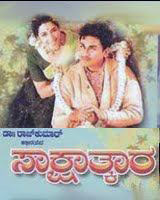
Sakshatkara is a 1971 Indian Kannada-language drama film directed by Puttanna Kanagal and starring Dr. Rajkumar, Jamuna, Prithviraj Kapoor and R. Nagendra Rao. This was third and final collaboration of Kanagal and Rajkumar. Sundar Krishna Urs was the associate director on the film.

Nyayave Devaru is a 1971 Indian Kannada-language film directed by Siddalingaiah. It stars Rajkumar and B. Saroja Devi. The supporting cast features K. S. Ashwath, Aarathi, Dwarakish, M. P. Shankar, Dinesh, B. Jaya and Vajramuni. The song "Akashave Beelali Mele" from the film went on to become one of the biggest hits ever.

Doorada Betta is a 1973 Kannada-language film directed by Siddalingaiah. The film starred Rajkumar and Bharathi Vishnuvardhan in lead roles withBalakrishna, K. S. Ashwath, Leelavathi and Sampath playing supporting roles. The film, along with Mooruvare Vajragalu was Rajkumar's last movie in black-and-white.
Miss Leelavathi is a 1965 Indian Kannada language film directed by M. R. Vittal and written by Korati Srinivasa Rao. It stars Jayanthi in the titular role, along with Udaykumar, K. S. Ashwath, Ramesh, and others. The film won the National Award for second best film in Kannada.

Gaali Gopura is a 1962 Kannada-language film directed and produced by B. R. Panthulu. The film stars Rajkumar, Kalyan Kumar, Leelavathi and R. Nagendra Rao, with Udaya Kumar making a brief guest appearance. Acclaimed director Puttanna Kanagal served as an assistant to Panthulu during this film's production.

Nanda Deepa is a 1963 Indian Kannada-language romantic drama film, directed by M. R. Vittal in his directinoal debut. The film was produced and written by actor Vadiraj with Jawahar co-producing for the Sri Bharathi Chitra studio, marking its first production. The film stars Rajkumar and Harini, with Leelavathi and Udaykumar in pivotal supporting roles.

Ranadheera Kanteerava is a 1960 Indian Kannada-language historical drama biographical film directed by the editor-turned-director N. C. Rajan and written by G. V. Iyer. It is one of the most popular films of Kannada actor Rajkumar, who plays the role of an emperor Kanthirava Narasaraja I of the Wodeyar dynasty, Mysore, who was fondly known as Ranadheera Kantheerava. The film depicts the life of Kanteerava, who is known for his immense physical strength, particularly in wrestling. The film was credited to be one of the most authentic historical films made since it was entirely based on the documents found in the Mysore Palace. The film also stars Udaykumar, Leelavathi, K. S. Ashwath and Sandhya Shantaram in prominent roles.

Mantralaya Mahatme is a 1966 Indian Kannada-language film directed by T. V. Singh Thakur, based on the book Sri Raghavendra Vijaya written by Rajaguru Rajacharya. The film stars Rajkumar in the role of Raghavendra Swami, a Hindu saint who lived in the 17th-century India. Udaykumar, Jayanthi and Kalpana appear in pivotal roles. Dorai–Bhagavan were extensively involved in the production and direction department of this film. The film is being colorised in wide-screen and set to release in 2022.

Kanyarathna is a 1963 Indian Kannada language film directed by J. D. Thotan in his directorial debut. It stars Dr. Rajkumar and Leelavathi. The supporting cast features Rajashankar, Balakrishna, Dikki Madhava Rao, Rathnakar and Sowcar Janaki.
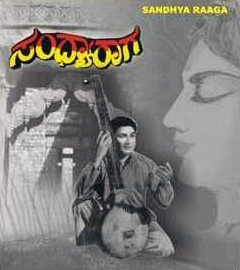
Sandhya Raga is a 1966 Indian Kannada-language film directed by A. C. Narasimha Murthy and co-produced by him alongside A. Prabhakara Rao. The film stars Rajkumar, Udaykumar, Narasimharaju and K. S. Ashwath. The musical score was composed by G. K. Venkatesh.
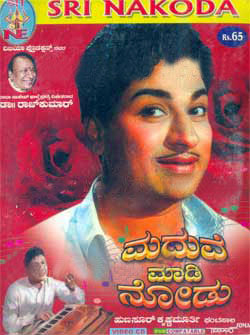
Maduve Madi Nodu is a 1965 Indian Kannada-language film, directed by Hunsur Krishnamurthy and produced by Nagi Reddi and Chakrapani. The film stars Rajkumar, R. Nagendra Rao, Udaykumar and Narasimharaju. The film has a musical score composed by Ghantasala. It is a remake of the producer's own Telugu film Pelli Chesi Choodu (1952). The film was a profitable venture and was declared a super hit.
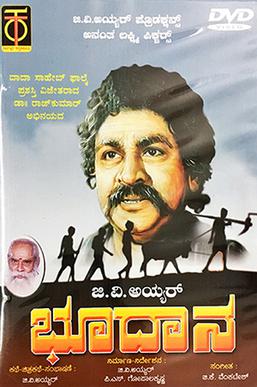
Bhoodana is a 1962 Indian Kannada-language film jointly directed and produced by G. V. Iyer and P.S. Gopalkrishna. The film stars Rajkumar, Kalyan Kumar, Udaykumar, and K. S. Ashwath, with a musical score by G. K. Venkatesh.

Swarna Gowri is a 1962 Indian Kannada-language film, directed by Y. R. Swamy and produced by D. R. Naidu. The film stars Rajkumar, Krishna Kumari, Udaykumar and Narasimharaju. The film has musical score by M. Venkataraju. The movie was simultaneously shot in Telugu with the same name by the same producer and director with Kanta Rao and Krishna Kumari in the lead roles.
Rathna Manjari is a 1962 Indian Kannada-language film, directed and produced by Hunsur Krishnamurthy, with D. Puttaswamy serving as co-producer. The film stars Udaykumar, Narasimharaju, K. S. Ashwath and C. V. Shivashankar, with a musical score composed by Rajan–Nagendra. H.R. Bhargava served as the assistant director of this film. The film was later dubbed in Telugu under the title Maya Mohini and into Tamil with the same title, both released in 1962.

Santha Thukaram is a 1963 Indian Kannada language film directed by Sundar Rao Nadkarni and produced by B. Radhakrishna. The film stars Rajkumar and Leelavathi with Udaykumar, K. S. Ashwath and T. N. Balakrishna. The musical score was composed by Vijaya Bhaskar.

Dharma Vijaya is a 1959 Indian Kannada-language film, directed by N. Jagannath and produced by T. Madar. The film stars Rajkumar, Narasimharaju, Siddayyaswamy and Sadashivaiah. The film has musical score by G. K. Venkatesh. Midway through the movie, M. R. Vittal assumed the responsibilities of directing the movie and completed the shoot though he refused to be credited as the director.
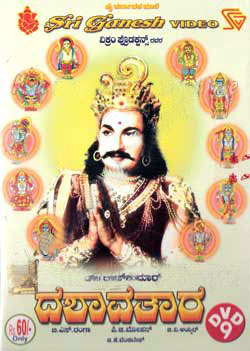
Dashavathara is a 1960 Indian Kannada-language film, directed by P. G. Mohan and produced by B. S. Ranga. The film stars Rajkumar, Udaykumar, Rajashankar and Narasimharaju. The film has a musical score by G. K. Venkatesh. This film' sclimax scene was shot in Eastmancolor.
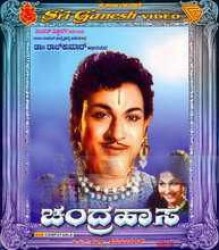
Chandrahasa is a 1965 Indian Kannada-language film directed and produced by B. S. Ranga. The film stars Rajkumar, Udaykumar, K. S. Ashwath and Narasimharaju. The film had musical score by S. Hanumantha Rao.
M. R. Vittal was an Indian film director and screenwriter who worked primarily Kannada cinema. He directed over 18 films in his career, with most of them being very successful and attaining a cult status. In a career spanning two decades, Vittal won three National Award and three Karnataka State Awards for his films.

Bandipotu (transl. Bandit) is a 1963 Indian Telugu-language swashbuckler film directed by B. Vittalacharya. It stars N. T. Rama Rao and Krishna Kumari, with music composed by Ghantasala. Tripuraneni Maharadhi wrote the story and dialogues. The film was produced by Sunderlal Nehataa and Doondy under the Raja Lakshmi Productions banner. Vittalacharya shot the film simultaneously in Kannada as Veera Kesari (1963), with Rajkumar. This film had its climax scene in Eastmancolor.

















